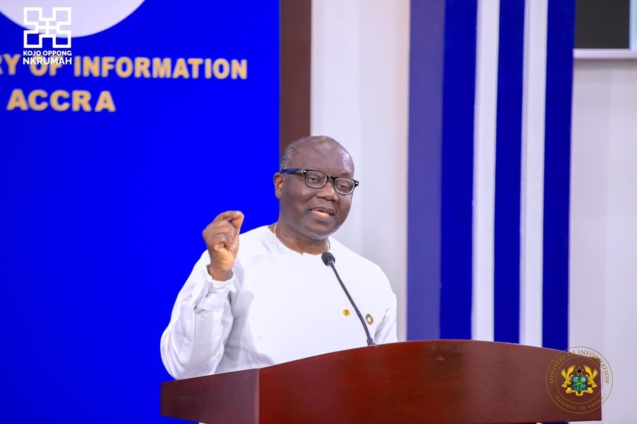Finance Minister, Ken Ofori-Atta, has pointed out that government will implement strategies including capping concessional and non-concessional borrowing to achieve a sustainable nominal debt-to-GDP. This according to him, would be key to reducing Ghana’s debt levels and ensuring timely servicing of debt.
He also indicated that the medium-term fiscal framework will, therefore, be anchored on fiscal adjustment and structural reforms to ensure long-term debt sustainability.
Ghana’s rising debt slowdown to ¢393.4 billion, about 78% of Gross Domestic Product.
Speaking recently in Parliament whilst presenting the 2022 Mid-Year Budget Review, the Finance Minister said if Ghana’s debt is to be brought to sustainable levels, an aggressive fiscal consolidation plan will need to be accelerated to ensure the return of the primary balance to surplus territory in the medium to long-term.
According to him, government conducted a Debt Sustainability Analysis (DSA) in June 2022 to evaluate the solvency and liquidity status of the country’s total public debt portfolio, while considering current and future debt service obligations.
He stressed that “the outlook for Ghana’s debt sustainability is challenged by emerging risks and vulnerabilities. Global exogenous shocks including weak recovery from Covid-19 pandemic, investor sentiments, exchange rate depreciation, high inflation, negative primary balances, and the crystallisation of contingent liabilities from both the energy and financial sectors will pose significant solvency and liquidity risks in the medium to long-term.”
Update on Ghana’s Credit Ratings for 2022
The Finance Minister admitted that global sovereign credit ratings have been quite turbulent.
Fiscal and balance of payments accounts for most Emerging Market economies were expected to taper down but there is a lingering need for fiscal stimulus whiles other external volatilities persist.
Mr. Ofori-Atta said notwithstanding these developments, there was optimism at the beginning of 2022 that these risks would be abated and for the fiscal and balance of payments accounts to return to the pre-Covid-19 period performance levels.
However, Russia’s invasion of Ukraine heightened volatility and further manifested itself in elevated inflation and inflation expectations, widening fiscal deficits, and worsening current account deficits for import-reliant economies.
Latest Stories
-
Costly rollover contracts to sink Ghana’s troubled cocoa sector even deeper
4 minutes -
The NSS Scandal: Here’s why the new DG’s defence of ghost names digital platform/metric app is shocking
6 minutes -
‘You can’t intimidate me!’ – Ahiafor clashes with Afenyo-Markin
11 minutes -
Review Supreme Court’s jurisdiction before capping judge appointments – Justice Amaleboba
14 minutes -
Kumasi to undergo major clean-up ahead of Eswatini King’s royal visit
19 minutes -
Marital property law is gender-neutral and equitable – Justice Amaleboba
30 minutes -
Dr Bawumia is best positioned to lead NPP into 2028 – Egyapa Mercer
35 minutes -
CWC 2025: Can Xabi Alonso lead Real Madrid to victory?
38 minutes -
Mahama calls on MMDCEs to restore public trust through stakeholder collaboration
41 minutes -
Ghanaian destinies hang in the balance as US considers travel clampdown
42 minutes -
Mahama signals end of appointed MMDCEs, backs popular demand for elections
45 minutes -
Mahama cautions MMDCEs against misuse of Common Fund, vows no protection for offenders
52 minutes -
Socio-economic barriers responsible for fertility crisis, not desire – UNFPA global report
55 minutes -
West African agricultural stakeholders affirm commitment to prioritising soil health
55 minutes -
Assets declaration: Mahama’s sanction against flouting Ministers isn’t power usurpation – Justice Amaleboba
56 minutes

